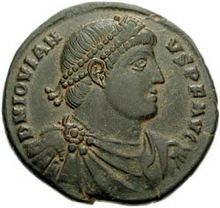364
| Millennium: | 1st millennium |
|---|---|
| Centuries: | |
| Decades: | |
| Years: |
| 364 by topic |
|---|
| Leaders |
| Categories |
| Gregorian calendar | 364 CCCLXIV |
| Ab urbe condita | 1117 |
| Assyrian calendar | 5114 |
| Balinese saka calendar | 285–286 |
| Bengali calendar | −229 |
| Berber calendar | 1314 |
| Buddhist calendar | 908 |
| Burmese calendar | −274 |
| Byzantine calendar | 5872–5873 |
| Chinese calendar | 癸亥年 (Water Pig) 3061 or 2854 — to — 甲子年 (Wood Rat) 3062 or 2855 |
| Coptic calendar | 80–81 |
| Discordian calendar | 1530 |
| Ethiopian calendar | 356–357 |
| Hebrew calendar | 4124–4125 |
| Hindu calendars | |
| - Vikram Samvat | 420–421 |
| - Shaka Samvat | 285–286 |
| - Kali Yuga | 3464–3465 |
| Holocene calendar | 10364 |
| Iranian calendar | 258 BP – 257 BP |
| Islamic calendar | 266 BH – 265 BH |
| Javanese calendar | 246–247 |
| Julian calendar | 364 CCCLXIV |
| Korean calendar | 2697 |
| Minguo calendar | 1548 before ROC 民前1548年 |
| Nanakshahi calendar | −1104 |
| Seleucid era | 675/676 AG |
| Thai solar calendar | 906–907 |
| Tibetan calendar | 阴水猪年 (female Water-Pig) 490 or 109 or −663 — to — 阳木鼠年 (male Wood-Rat) 491 or 110 or −662 |

Year 364 (CCCLXIV) was a leap year starting on Thursday (link will display the full calendar) of the Julian calendar. At the time, it was known as the Year of the Consulship of Augustus and Varronianus (or, less frequently, year 1117 Ab urbe condita). The denomination 364 for this year has been used since the early medieval period, when the Anno Domini calendar era became the prevalent method in Europe for naming years.[1][2]
Events
By place
Roman Empire
- February 17 – Emperor Jovian dies after a reign of eight months. He is found dead in his tent at Tyana (Asia Minor) en route back to Constantinople, in suspicious circumstances.
- February 26 – Valentinian I is proclaimed Emperor by officers of the Roman army at Nicaea in Bithynia. He addresses the soldiers (who threaten to riot) in a speech. He founds the Valentinianic dynasty and rules the Western portion of the Roman Empire, from Caledonia (Scotland) to the Rhine frontier, ensuring it a few years of relative security. He settles in Paris and establishes a militia to defend the region.
- March 28 – Valens, brother of Valentinian I, is appointed co-emperor (Augustus) in the palace of Hebdomon (Turkey). He rules the Eastern portion of the Roman Empire, from the Danube to the Persian border, and begins the first anti-pagan persecutions.
- Britain is forced to endure fierce barbarian raids.
By topic
Religion
- The Council of Laodicea decides some disciplinary questions of the church and attempts to establish the Biblical canon, but fails.
Science
- Theon of Alexandria, Greek mathematician, observes a solar eclipse (June 16) and a lunar eclipse (November 25). He gains some renown for his version of Euclid's Elements and his commentaries on Ptolemy's Almagest.
Births
- Blaesilla, Roman noblewoman (d. 384)
- Huiguo, Chinese Buddhist nun (d. 433)
- Sima Daozi, Chinese prince and regent (d. 403)
- Xu Xianzhi, Chinese official and regent (d. 426)
Deaths
- February 17 – Jovian, Roman emperor (b. 331)
- Ge Hong, Chinese scholar and taoist (b. 283)
- Theophilos the Indian, Christian bishop
References
- ^ Wacholder, Ben Zion (2001). "Calendar Wars Between the 364 and the 365-Day Year". Revue de Qumrân. 20 (2 (78)): 207–222. ISSN 0035-1725. JSTOR 24663055.
- ^ ZADOK, Ran (January 1, 1989). "Notes on the Historical Geography of Mesopotamia and Northern Syria". Ancient Near Eastern Studies. 27: 154–169. doi:10.2143/anes.27.0.2012496. ISSN 1378-4641.
